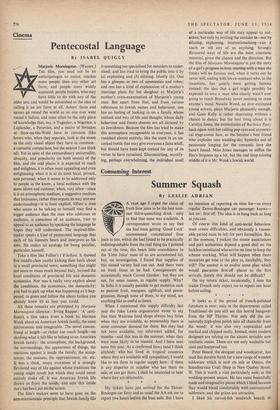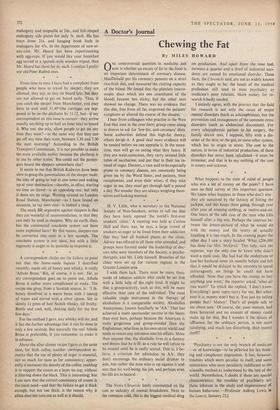Consuming Interest
Summer Squash
By LESLIE ADRIAN
A YEAR ago I urged the claim of fresh lime juice to be the best sum- mer thirst-quenching drink : only to find that none was available. A correspondent wrote to say that she had been getting `Good Luck' unsweetened concentrated lime juice in tinS, which she had found to be practically indistinguishable from the real thing (as I pointed out at the time, this bears little resemblance to the `Lime Juice' most of us are accustomed to), but, on investigation, I found that supplies of this tinned variety had run out. And there were no fresh limes to be had. Consignments do occasionally reach Covent Garden : but they are not, for some reason, in regular supply. Why? In Soho it is usually possible to get esoterica such as passion fruit, mangoes, uglifruit, and pome- granates, though none of them, to my mind, are anything like as useful as limes.
When I mentioned this supply difficulty last year the John Lewis organisation wrote to say that their Waitrose food shops always buy limes when they are available, so presumably there is some consumer demand for them. But they had not been available, my informant added, for months—and this was in the summer, when they were most likely to be wanted. And I have seen• none this year. As a confirmed limey (and I think anybody who has lived in tropical countries where they are available will sympathise), I would like to see them in regular supply here : if there is any importer or supplier who has them on sale, or can get them, I shall be interested to hear where they are obtainable.
My tickets have just arrived' for the hover Boulogne car ferry and as usual the AA ask me to report two hours before the boat sails. But I have no intention of reporting on time for—as every regular Dover-Boulogne car passenger knows— last on : first off. The idea is to hang back as long as you can.
Of course this kind of anti-social behaviour must create difficulties, and obviously a reason- able period must be left for port formalities. But, at the moment, I reckon the motor associations and port authorities depend a good deal on the luckless uninitiated who arrive on time to keep the scheme working. What will happen when &ore motorists get wise to the ploy as, inevitably, they will? The answer is to evolve some plan which would guarantee first-off places to the first arrivals. Surely • this should not be difficult?
On my return ticket, incidentally, I note the realist French only expect me to report one hour before sailing.
It looks as if the period of french-polished furniture is over; only in the departments called Traditional do you still see this horrid hangover from the HP Thirties. Not only did the un- naturally high-gloss polish take all character from the wood : it was also very unpractical and marked and chipped easily. Instead, more modern designers are relying on the almost invisible new synthetic resins. These are not only washable but stain and heatproof too.
• Peter Heard, the designer and woodcarver, has used this durable finish for a new range of wooden tableware which is now on sale at Ostmo, the Scandinavian Craft Shop in New Quebec Street, W. This is worth a visit particularly now, at the wedding-present season. He has some beautifully made and imaginative pieces which I liked because they would' blend comfortably with conventional tableware, and the prices are attractive.
I liked his carved-fish sandwich boards in mahogany and magnolia at 24s., and fishrshaped_ mahogany side plates for only 3s. each. He has trays from 21s. and hanging book hods in mahogany for 45s. In the department of new-at- any-cost. Mr. -Heard has been experimenting with egg-cups. If you would like your breakfast egg served in a sputnik-style wooden tripod, then Mr. Heard has them for 6s. each. I confess I prefer our old Peter Rabbit ones.
From time to time I have had a complaint from people who have to travel by sleeper; they are allowed, they say, to stay on board late; but they are not allowed to get on board early. Thus, if you catch the sleeper from Manchester, you may have to wait until 11.40 (the carriages are sup- posed to be on the platform by 11.12, but—if my correspondent on this issue is correct—theY arrive usually anything up to half an hour late) to board it. Why not, she asks, allow people to get On any time they want?—in the same way that they can get of any time they want, between 5.30 and 7.30 the next morning? According to the British Transport Commission, `it is not possible to make the train available earlier because the platform is in use by other trains.' But could not the passen- gers board the sleepers somewhere else?
It seems to me that British Railways have been slow to grasp the potentialities of the sleeper trade; the idea of going to bed in one town and waking up at your destination—thereby, in effect, wasting no time on travel—is an appealing one; but only if there are no snags. Waiting around on London Road Station, Manchester—as I have found on occasion, to my own cost—is indeed a snag.'
The stock BR argument against sleepers is that they are wasteful of accommodation; in that they can only be used as sleepers. Why on earth, then, has the continental couchette system not been more exploited here? By this means, sleepers can be converted into seats in a few seconds. The couchette system is not ideal, but with a little ingenuity it ought to be possible to improve it.
* * *
A correspondent chides me for failure to point out that the home-made liqueur I described recently, made out of honey and whisky, is really `Athole Brose.' But, of course, it is not : for, as my correspondent goes on to point out, Athole Brose is rather more complicated to make. The recipe she gives, from a Scottish source, is : `1 lb. honey dissolved in a warm basin with 1 teacup of water and stirred with a silver spoon. Stir in slowly 14. pints of best.Scotch whisky, till frothy. Bottle and cork well, shaking daily for the first few days.'
For the method I gave, any whisky will do; and it has the further advantage that it can be done in only a few seconds. But naturally the real Athole Brose is preferable, if you remember to make it in advance.
About the after-dinner recipe I gave at the same time, for Irish coffee, another correspondent re- marks that the use of plenty of sugar is essential, not so much for taste as for consistency; appar- - ently it increases the density of the coffee, enabling it to support the cream as a layer on top, without it filtering down the black. This is interesting; but I am sure that the correct consistency of cream is the main need—and that the failure to get it thick enough, but not too thick, is the reason why it often does not turn out as well as it should.



































 Previous page
Previous page